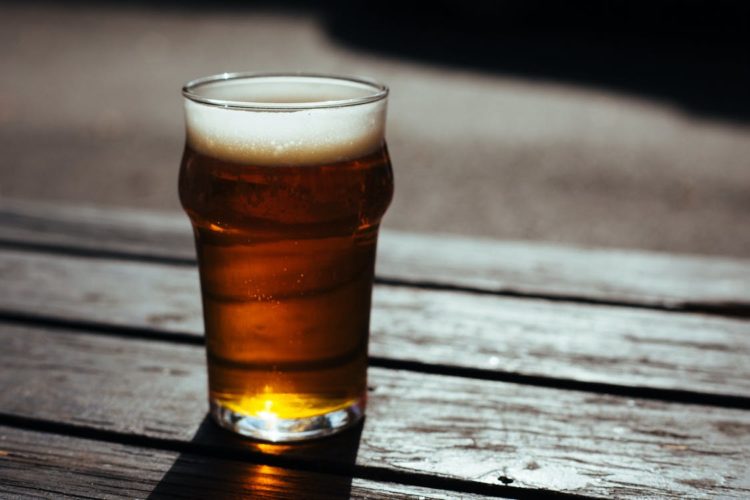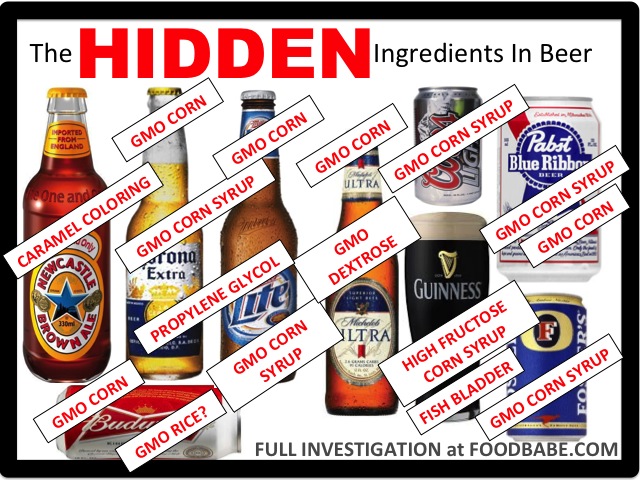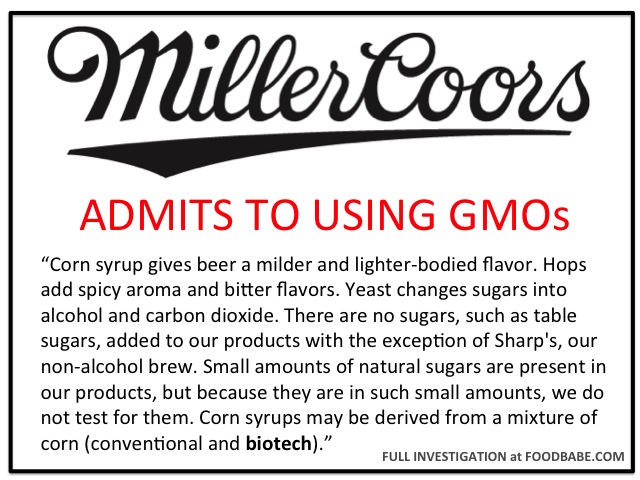The Shocking Ingredients in Beer

Want man boobs or reduced testosterone? Then keep drinking beer with hops in it.
Beer, especially American beer, is made with all sorts of ingredients beyond the basic hops, malt and yeast. There are numerous other ingredients used to clarify, stabilize, preserve, enhance the color and flavor of beer.
When you drink beer, there is almost a 100% chance that you don’t know what you are drinking (unless you quizzed the beer companies like I did). The ingredients in beer are not required by law to be listed anywhere on the label and manufacturers have no legal obligation to disclose the ingredients. For regular beer, calorie levels and percent alcohol are optional and for light beer calories are mandatory but alcohol levels are optional.
Michele Simon, a public health lawyer, author of Appetite for Profit, and president of Eat Drink Politics told me the reason that beer companies don’t disclose ingredients is simple: they don’t have to.
“Ingredient labeling on food products and non-alcoholic beverages is required by the Food and Drug Administration. But a whole other federal agency regulates beer, and not very well. The Department of Treasury – the same folks who collect your taxes – oversees alcoholic beverages. That probably explains why we know more about what’s in a can of Coke than a can of Bud. You can also thank the alcohol industry, which has lobbied for years against efforts to require ingredient labeling.”
I figured if the beer companies aren’t required to tell us the exact list of ingredients, I needed to investigate this for myself and asked them the pointed questions until I got the truth.

First of all, I was able to obtain a baseline list of “legal” additives allowed in beer from the book “Chemicals Additives in Beer” by the Center of Science and Public Interest. This list allowed me to ask specific questions about each beer I investigated. For example – beer sold here in America can contain several of the following ingredients:
- Monosodium Glutamate (MSG) – alcohol is already addictive with some people, but with MSG?! Holy smokes.
- Propylene Glycol (an ingredient found in anti-freeze)
- Calcium Disodium EDTA (made from formaldehyde, sodium cayanide, and Ethylenediamine)
- Many different types of Sulfites and Anti-microbial Preservatives (linked to allergies and asthma)
- Natural Flavors (can come from anything natural including a beavers anal gland)
- GMO Sugars – Dextrose, High Fructose Corn Syrup
- Caramel Coloring (Class III or IV made from ammonia and classified as a carcinogen)
- FD&C Blue 1 (Made from petroleum, linked to allergies, asthma and hyperactivity)
- FD&C Red 40 (Made from petroleum, linked to allergies, asthma and hyperactivity)
- FD&C Yellow 5 (Made from petroleum, linked to allergies, asthma and hyperactivity)
- Insect-Based Dyes: carmine derived from cochineal insects to color their beer.
- Animal Based Clarifiers: Findings include isinglass (dried fish bladder), gelatin (from skin, connective tissue, and bones), and casein (found in milk)
- Foam Control: Used for head retention; (glyceryl monostearate and pepsin are both potentially derived from animals)
- BPA (Bisphenol A is a component in many can liners and it may leach into the beer. BPA can mimic the female hormone estrogen and may affect sperm count, and other organ functions.)
During my investigation, I couldn’t get a single mainstream beer company to share the full list of ingredients contained in their beer. But I did get some of them to fess up to the use of these ingredients in writing so I’m going to share this information with you now.
Carcinogenic Caramel Coloring
Newcastle, a UK brand, confessed to using what I would consider one of the most controversial food additives. Toasted barley is usually what gives beer its golden or deep brown color, however in this case, Newcastle beer is also colored artificially with caramel color. This caramel coloring is manufactured by heating ammonia and sulfites under high pressure, which creating carcinogenic compounds. If beer companies were required by law to list the ingredients, Newcastle would likely have to have a cancer warning label under California law because it is a carcinogen proven to cause liver tumors, lung tumors, and thyroid tumors in rats and mice.
Genetically Modified Organisms (GMOs)
Many of the beers I questioned contained one or more possible GMO ingredients.
- High Fructose Corn Syrup (Guinness – unable to provide an affidavit for non-GMO proof)
- Corn syrup (Miller Light, Coors, Corona, Fosters, Pabst Blue Ribbon, Red Stripe)
- Dextrose (Budweiser, Bud Light, Busch Light, Michelob Ultra)
- Corn (Red Stripe, Miller Coors Brand, Anheuser-Busch Brands)
Most beers brewed commercially are made with more GMO corn than barley. Many of the companies I contacted dodged the GMO question – however Miller Coors had a very forthcoming and honest response. They stated “Corn syrup gives beer a milder and lighter-bodied flavor” and “Corn syrups may be derived from a mixture of corn (conventional and biotech.)”, admitting their use of GMOs.

Pabst Blue Ribbon responded saying their corn syrup was “special” and “made of carbohydrates and some simple sugars like dextrose and maltose. The sugars are fermented into alcohol and CO2, and the carbohydrates, both from the corn syrup and the malt, remain in the beers as flavor, color and body components.”
Dextrose and maltose can come from a variety of substances that are sweet, but likely are derived from GMO corn because it is super cheap for a company to use corn instead of fruit or other non-GMO sources. With cheap beer – you are not just getting a cheap buzz, you are getting the worst of the worst. Just like with cheap fast food – if you don’t invest in your beer – you will be drinking a lower quality product like Pabst Blue Ribbon that is made from GMO Corn and Corn Syrup.
In 2007, Greenpeace found unapproved and experimental GMO Rice strain in Anheuser-Busch (Budweiser, Bud Light) beer. Anheuser-Busch responded saying their US-grown long-grained rice “may have micro levels” of a genetically engineered protein called Liberty Link, but added that the protein is “substantially removed or destroyed” during the brewing of beer sold domestically. Don’t you think it’s hard to trust any beer company that gets caught using experimental food made in a laboratory? GMOs have not been tested long term on human beings and one of the main pesticides (Roundup) they spray on GMO crops are linked to inflammation, cancer and other diseases.

High Fructose Corn Syrup & Fish Bladders
Speaking of trusting companies, let’s get one thing straight, Guinness beer is no longer owned by the Irish, they are now owned by a large beer conglomerate called Diageo and manufactured in over 50 different countries. No matter how many St. Patty’s Day celebrations you’ve had with this dark stout, it’s time to stop because they use high fructose corn syrup in their beer. But, Guinness beer also contains isinglass, a gelatin-like substance produced from the swim bladder of a fish. This ingredient helps remove any “haziness,” solids, or yeast byproducts from the beer. Mmmmm… fish bladder sounds delicious, doesn’t? The sneaky thing this beer company does like many of the companies mentioned here today is create an illusion of using the best ingredients when in actuality what they tell you publicly on their websites is a complete farce. On Guinness FAQ’s – they have a question that states: “What are the key ingredients in Guinness” and the answer doesn’t reveal the whole picture – it only states “Our key ingredients – other than inspiration – are roasted, malted barley, hops, yeast and water.” What BS, right? You have to call, email, question and know the right things to ask to even have a chance at getting the truth.
